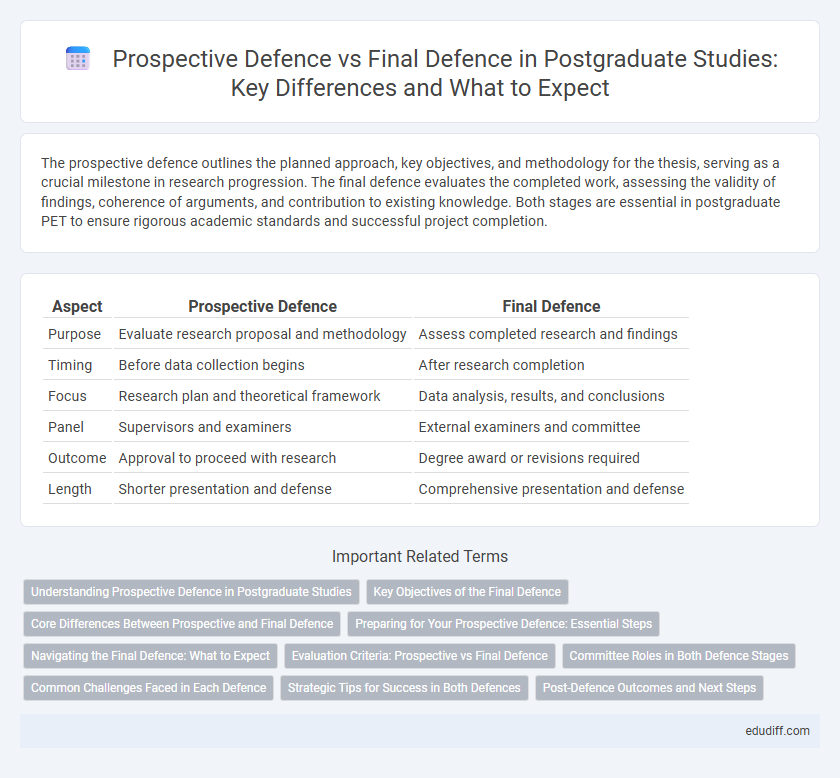The prospective defence outlines the planned approach, key objectives, and methodology for the thesis, serving as a crucial milestone in research progression. The final defence evaluates the completed work, assessing the validity of findings, coherence of arguments, and contribution to existing knowledge. Both stages are essential in postgraduate PET to ensure rigorous academic standards and successful project completion.
Table of Comparison
| Aspect | Prospective Defence | Final Defence |
|---|---|---|
| Purpose | Evaluate research proposal and methodology | Assess completed research and findings |
| Timing | Before data collection begins | After research completion |
| Focus | Research plan and theoretical framework | Data analysis, results, and conclusions |
| Panel | Supervisors and examiners | External examiners and committee |
| Outcome | Approval to proceed with research | Degree award or revisions required |
| Length | Shorter presentation and defense | Comprehensive presentation and defense |
Understanding Prospective Defence in Postgraduate Studies
Understanding prospective defence in postgraduate studies involves anticipating potential challenges and questions related to the research proposal before the official presentation. This stage allows candidates to refine their methodology, clarify objectives, and address feedback from supervisors or panel members to strengthen the eventual final defence. Prospective defence serves as a critical preparatory step, ensuring that the research is robust and meets academic standards prior to formal evaluation.
Key Objectives of the Final Defence
The key objectives of the Final Defence in a postgraduate program include demonstrating a comprehensive understanding of the research topic, effectively addressing all feedback from the Prospective Defence, and validating the originality and significance of the thesis findings. It serves as a critical evaluation where the candidate must convincingly defend methodology, data analysis, and conclusions before a panel of experts. This stage ultimately confirms the candidate's readiness for degree conferral and contribution to the academic field.
Core Differences Between Prospective and Final Defence
Prospective defence involves the initial presentation and approval of a research proposal or thesis plan, focusing on the research objectives, methodology, and feasibility. Final defence requires the comprehensive evaluation of the completed thesis or dissertation, assessing the validity of results, analysis, and conclusions. Core differences include timing within the academic process and the scope of assessment, with prospective defence emphasizing planning and final defence validating the completed research work.
Preparing for Your Prospective Defence: Essential Steps
Preparing for your prospective defence involves thoroughly reviewing your research proposal, ensuring clarity in your objectives, methodology, and expected outcomes. It is crucial to anticipate potential questions from committee members and practice articulating your research significance and feasibility. Organizing your presentation to highlight key contributions and addressing any preliminary feedback will strengthen your defence readiness.
Navigating the Final Defence: What to Expect
Navigating the final defence involves presenting your research findings confidently and responding to critical questions from the examination panel focused on methodology, data analysis, and theoretical implications. Unlike the prospective defence, which emphasizes research design and proposed methods, the final defence requires demonstrating comprehensive understanding and contribution to your field through robust evidence and clear articulation. Preparation should include reviewing committee feedback, anticipating challenging questions, and practicing concise explanations to showcase scholarly maturity and defend your conclusions effectively.
Evaluation Criteria: Prospective vs Final Defence
Evaluation criteria for Prospective Defence emphasize the clarity of research objectives, feasibility of methodology, and alignment with academic standards to ensure the proposed study's viability. In contrast, Final Defence evaluation centers on the originality of findings, robustness of data analysis, and contribution to the field, assessing the completed research's scholarly impact. Both assessments demand rigorous scrutiny but differ in focus from proposal potential to research execution and outcomes.
Committee Roles in Both Defence Stages
The Prospective Defence committee primarily evaluates the research proposal's feasibility, theoretical framework, and methodology to ensure the project's viability before data collection begins. In contrast, the Final Defence committee assesses the completed research for originality, data analysis accuracy, and contribution to the academic field, verifying alignment with institutional standards. Both committees typically include the supervisor, internal examiners, and external experts who provide critical feedback and determine the candidate's readiness for degree conferment.
Common Challenges Faced in Each Defence
Prospective Defence challenges often include incomplete research data, unclear methodology, and difficulty articulating the research scope, which can hinder committee approval. In contrast, Final Defence commonly faces issues such as defending unexpected results, addressing extensive reviewer feedback, and ensuring all thesis components align coherently. Both defences require thorough preparation, strong presentation skills, and the ability to respond confidently to critical questions.
Strategic Tips for Success in Both Defences
Prospective Defence requires a clear articulation of research questions and methodology to gain committee approval, while Final Defence demands comprehensive presentation and defense of results and conclusions. Prioritize thorough preparation by anticipating questions and addressing potential weaknesses in both stages. Effective communication, confidence, and mastery of subject matter significantly enhance chances of success in postgraduate defences.
Post-Defence Outcomes and Next Steps
Prospective Defence involves preparing and validating research progress before final submission, serving as a crucial checkpoint for identifying gaps and refining methodologies. Final Defence assesses the complete thesis with examination committees evaluating research contributions and academic rigor. Post-Defence outcomes determine acceptance, conditional revisions, or rejection, with next steps including manuscript revisions, publication planning, and potential graduation or further research development.
Prospective Defence vs Final Defence Infographic

 edudiff.com
edudiff.com